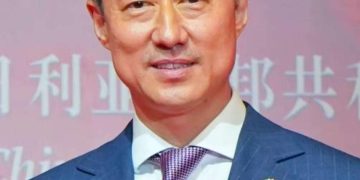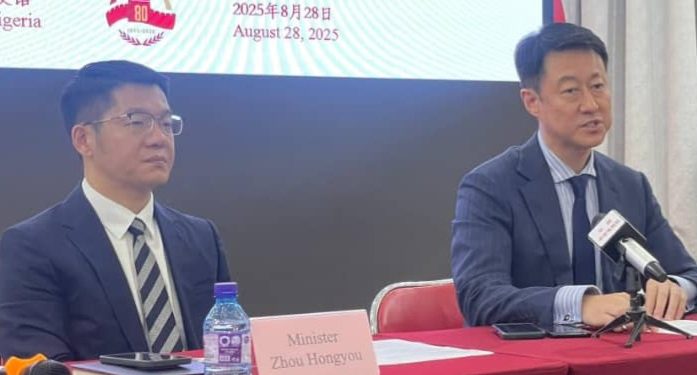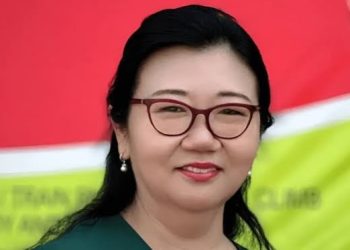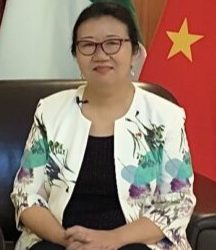- Chinese Ambassador Yu Dunhai (right) with another official at a symposium in Abuja on the 80th anniversary of the victory in the Chinese People’s War of Resistance against Japanese Aggression and the World Anti-Fascist War
By Anthony Nwachukwu
China has called for mutual respect and balanced approach to international relations as sure foundation for global peace and unity.
It also commended partners for their longstanding support for the China-Africa friendship, especially the China-Nigeria friendship, while urging stronger ties and global unity.
The Chinese Ambassador to Nigeria, His Excellency Yu Dunhai, made the call at a symposium in Abuja to mark the 80th anniversary of the Chinese people’s victory in the war of resistance against Japanese aggression and the world Anti-Fascist War.
Noting that the occasion was also the 80th anniversary of the restoration of Taiwan region, Dunhai said the symposium was “an opportunity to reflect on the past, honour our heroes, and reaffirm our commitment to peace and a shared future.
According to him, the incident in September 18, 1931 marked the beginning of China’s War of Resistance and the prelude to the main Eastern battlefield of the World Anti-Fascist War, with the Chinese people defeating the Japanese military invaders after 14 years of blood and fire.
Citing the tremendous sacrifices of the Chinese people, who fought to the end on the Eastern battlefield, to the ultimate victory, Dunhai also commended the Nigerian soldiers who fought against Japanese forces in British Burma to have also played a unique role in the shared fight for the victory.
He commended the Communist Party of China for its pivotal role in achieving victory, stating that at that critical moment when China’s existence hung in the balance, the CPC stepped forward to shoulder its historical responsibility by raising the banner of armed resistance and formed the Anti-Japanese National United Front, among other strategies.
Reflecting on the world’s ongoing transformations, he noted that humanity faces new and unprecedented challenges and should, therefore, not “dwell on hatred but remember history and renew our commitment to peace.
“We are here to learn from the past, to honour the sacrifices that were made, and to pledge together that such tragedies will never happen again.”
According to him, the right approach to truly honour this great victory is “to uphold a correct historical perspective on WWII and reject all forms of historical nihilism,” as well as any attempt to distort the truth of WWII, deny its outcome, or belittle China’s contribution.
“It falls to us to defend that victory, to safeguard the international system with the United Nations at its core, to protect the international order based on international law, and to uphold the fundamental norms of international relations as enshrined in the UN Charter,” Dunhai stated.
“Together, let’s forge new partnerships for win-win cooperation, stand firmly against hegemony, and join hands in building a brighter future for all humanity.”
Dunhai emphasised that China will never forget how hard it was to achieve its today’s peace, and therefore has remained firmly committed to the path of peaceful development.
He disclosed that in 2013, Chinese President Xi Jinping put forward the vision of building a community with a shared future for mankind, dedicated to the common interests and well-being of all humanity. The vision, he said, presents China’s approach to a better world and its wisdom in advancing global peace and prosperity.
Therefore, “over the past decade, through major initiatives such as the Belt and Road Initiative, the Global Development Initiative, the Global Security Initiative and the Global Civilization Initiative, this vision has taken root, flourished, and borne remarkable fruit,” Dunhai stated.
“It has not only shaped China’s own development but also that of the wider world. Through this vision, China has pioneered a distinct path to modernisation, creating a new form of human civilisation and offering a new option for all nations and peoples that seek to modernise rapidly without compromising their independence.”
He listed the return of Taiwan region to China as another outcome of that struggle, stating that it constitutes a key component of the post-war international order.
According to him, “as clearly stipulated in foundational international documents, especially the Cairo Declaration and the Potsdam Proclamation, Japan is obliged to return all territories seized from China, including the Taiwan Region.
“No matter how the situation in the Taiwan region evolves or what disruptions external forces may create, the historical trend toward China’s complete reunification is unstoppable.
Commending Nigeria for its firm adherence to the One-China principle, Dunhai reaffirms China’s support to Nigeria’s pursuit of a development path suited to its national conditions, as well as in playing an even greater role on the international stage.
He noted that with China and Nigeria as major developing countries, leading emerging economies and key members of the Global South, their “comprehensive strategic partnership has grown beyond bilateral scope and now carries significant global significance.”
Therefore, he urged collaboration to safeguard the outcomes of the WWII victory, uphold international fairness, justice and order, and inject more stability and certainty into the international community.
More so, the partnership will “advance the steady and sound development of China-Nigeria relations, and bring greater benefits to the peoples of both countries.”































